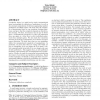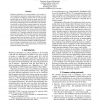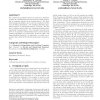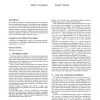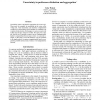33 search results - page 1 / 7 » Complexity of terminating preference elicitation |
ATAL
2008
Springer
13 years 6 months ago
2008
Springer
Complexity theory is a useful tool to study computational issues surrounding the elicitation of preferences, as well as the strategic manipulation of elections aggregating togethe...
CORR
2002
Springer
13 years 4 months ago
2002
Springer
Preference elicitation is a central problem in AI, and has received significant attention in single-agent settings. It is also a key problem in multiagent systems, but has receive...
SIGECOM
2004
ACM
13 years 9 months ago
2004
ACM
We consider the parallels between the preference elicitation problem in combinatorial auctions and the problem of learning an unknown function from learning theory. We show that l...
SIGECOM
2003
ACM
13 years 9 months ago
2003
ACM
We consider the problem of minimizing preference elicitation in efficient multiattribute auctions, that support dynamic negotiation over non-price based attributes such as qualit...
AAAI
2007
13 years 6 months ago
2007
Uncertainty arises in preference aggregation in several ways. There may, for example, be uncertainty in the votes or the voting rule. Such uncertainty can introduce computational ...
